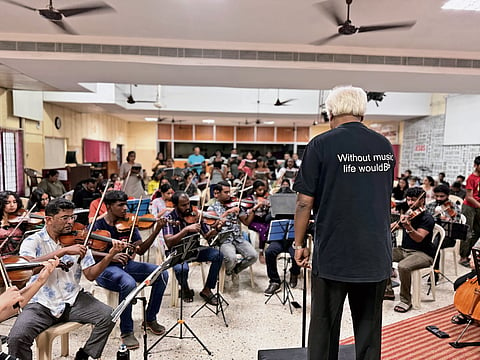
- LIFESTYLE
- FASHION
- FOOD
- ENTERTAINMENT
- EVENTS
- CULTURE
- VIDEOS
- WEB STORIES
- GALLERIES
- GADGETS
- CAR & BIKE
- SOCIETY
- TRAVEL
- NORTH EAST
- INDULGE CONNECT

Few compositions in the history of Western classical music command as much reverence as Johann Sebastian Bach’s Mass in B Minor. An intricate and monumental work, it stands as a testament to Bach’s compositional genius. In our city, where Western classical music is a niche but thriving pursuit, the Madras Musical Association (MMA) is set to present a rare, full-length performance of this masterpiece.
For conductor Augustine Paul, who has been at the helm of MMA for years, this moment is both a personal and professional milestone. “Every conductor dreams of performing Mass in B Minor at least once in their lifetime,” he says. “It is one of the most challenging works in the choral repertoire, both in terms of length and complexity. It’s a mountain to scale.”
Bach’s composition is not just lengthy—clocking in at around two hours—but also immensely demanding for both singers and instrumentalists. “The technical demands are immense,” he notes. “For the choir, the harmonies are layered and complex. The orchestra must match that precision while ensuring balance and texture. It’s not an easy piece to take on. Since 1980, I don’t think anyone here has done it from start to finish here,” Augustine says.
“Even in India, it hasn’t been performed frequently. This might be a first for Chennai.”
A significant aspect of this production is the orchestration. The MMA will use a full-fledged Baroque orchestra, distinct from the larger symphony orchestras that developed in later musical periods. “A Baroque orchestra doesn’t have trombones or clarinets, but the oboe plays a crucial role,” he explains. “It carries many of the melodic lines and adds a distinct tonal colour.”
The challenge, however, was finding an oboist in Chennai. “Until last year, we didn’t have one. Now we do, and she has picked up the instrument remarkably well in a short span of time.”
The MMA’s choir and orchestra are also notable for their youthful composition. “Half of our orchestra is made up of students—young musicians still in school or college,” says Augustine. “Our choir, too, has many college-going singers. It’s incredible to see young talent take on such a complex piece.”
Synchronising the different elements of the composition rests on Augustine’s shoulders. “Conducting isn’t just about keeping time,” he says. “It’s about shaping the sound, bringing out hidden melodies, and ensuring that the right sections shine at the right moments.”
In the composition, thematic lines weave in and out of different voices and instruments. “There’s a constant interplay,” he explains. “A soprano solo might be mirrored by a violin solo. An alto might be paired with an oboe. It’s an extraordinary blending of textures.”
One of the most poignant aspects of Mass in B Minor is that Bach himself never heard it performed in its entirety. “In a way, every performance of this is a tribute to Bach,” he reflects. “His music went unperformed for a time, until composers like Felix Mendelssohn revived it. Bach himself never travelled more than 200 km from his home, but his music has now reached every corner of the world.”
For Chennai this performance is more than just a concert—it is an event of historical significance. “It is a privilege to bring this work to life here,” says Augustine. “We haven’t imported soloists or musicians from outside. This is a completely homegrown effort.”
This weekend, when the first notes of Bach’s Mass in B Minor ring out in our city, it won’t just be the culmination of weeks of hard work—it will be a moment of musical history in the making.
Rs 500 onwards . April 6, 6.30 pm onwards. At Museum theatre, Egmore.